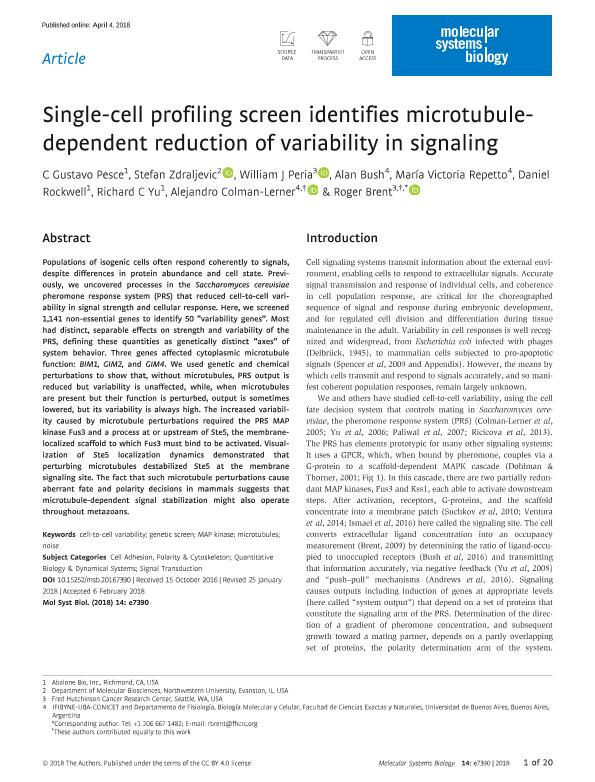Artículo
Single-cell profiling screen identifies microtubule-dependent reduction of variability in signaling
Pesce, Gustavo C.; Zdraljevic, Stefan; Peria, William J.; Bush, Alan ; Repetto, María Victoria
; Repetto, María Victoria ; Rockwell, Daniel; Yu, Richard C.; Colman Lerner, Alejandro Ariel
; Rockwell, Daniel; Yu, Richard C.; Colman Lerner, Alejandro Ariel ; Brent, Roger
; Brent, Roger
 ; Repetto, María Victoria
; Repetto, María Victoria ; Rockwell, Daniel; Yu, Richard C.; Colman Lerner, Alejandro Ariel
; Rockwell, Daniel; Yu, Richard C.; Colman Lerner, Alejandro Ariel ; Brent, Roger
; Brent, Roger
Fecha de publicación:
04/2018
Editorial:
Nature Publishing Group
Revista:
Molecular Systems Biology
ISSN:
1744-4292
Idioma:
Inglés
Tipo de recurso:
Artículo publicado
Clasificación temática:
Resumen
Populations of isogenic cells often respond coherently to signals, despite differences in protein abundance and cell state. Previously, we uncovered processes in the Saccharomyces cerevisiae pheromone response system (PRS) that reduced cell-to-cell variability in signal strength and cellular response. Here, we screened 1,141 non-essential genes to identify 50 “variability genes”. Most had distinct, separable effects on strength and variability of the PRS, defining these quantities as genetically distinct “axes” of system behavior. Three genes affected cytoplasmic microtubule function: BIM1, GIM2, and GIM4. We used genetic and chemical perturbations to show that, without microtubules, PRS output is reduced but variability is unaffected, while, when microtubules are present but their function is perturbed, output is sometimes lowered, but its variability is always high. The increased variability caused by microtubule perturbations required the PRS MAP kinase Fus3 and a process at or upstream of Ste5, the membrane-localized scaffold to which Fus3 must bind to be activated. Visualization of Ste5 localization dynamics demonstrated that perturbing microtubules destabilized Ste5 at the membrane signaling site. The fact that such microtubule perturbations cause aberrant fate and polarity decisions in mammals suggests that microtubule-dependent signal stabilization might also operate throughout metazoans.
Palabras clave:
CELL-TO-CELL VARIABILITY
,
GENETIC SCREEN
,
MAP KINASE
,
MICROTUBULES
,
NOISE
Archivos asociados
Licencia
Identificadores
Colecciones
Articulos(IFIBA)
Articulos de INST.DE FISICA DE BUENOS AIRES
Articulos de INST.DE FISICA DE BUENOS AIRES
Articulos(IFIBYNE)
Articulos de INST.DE FISIOL., BIOL.MOLECULAR Y NEUROCIENCIAS
Articulos de INST.DE FISIOL., BIOL.MOLECULAR Y NEUROCIENCIAS
Citación
Pesce, Gustavo C.; Zdraljevic, Stefan; Peria, William J.; Bush, Alan; Repetto, María Victoria; et al.; Single-cell profiling screen identifies microtubule-dependent reduction of variability in signaling; Nature Publishing Group; Molecular Systems Biology; 14; 4; 4-2018; 1-20
Compartir
Altmétricas



